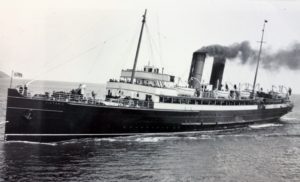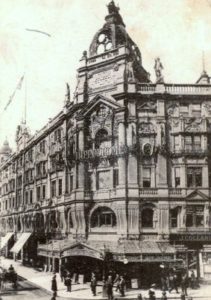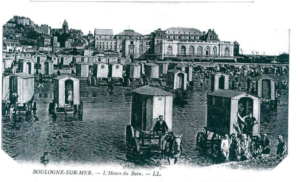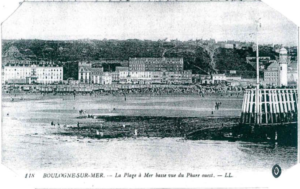WW1 Diary
21st June 1916 Wednesday
All material produced or reproduced here and throughout this work is the sole copyright of the author and the family of Doctor D.C.M. Page MC.
“Got on board the S.S Victoria at 2 o’clock and got a seat and a lifebelt. There was a big crowd on board, including lots of nurses and Australian soldiers. We were conveyed across the channel by a destroyer and two hospital ships full of wounded followed us. On the way four boats full of soldiers passed us going to France. It was a sunny day and the coast of England looked perfect.
Soon we arrived at Folkestone and then by train to good old London, which we reached just before 7 o’clock. There were huge crowds at Victoria Station waiting to meet the troops, but I had nobody waiting for me. I was thrilled to the marrow.
I trailed across London to Kings Cross where I left my luggage – such as it was – then to the London Hippodrome to see Harry Tate in Joy-Land. It was a good show. I left London for ‘Auld Reekie’ by the 11.45pm train.”

The South Eastern and Chatham Railway Company steamer Victoria. Built 1907

London Hippodrome
Listen to the very same song that Douglas heard in the show Joy-Land sung by the same artist that he saw Miss Shirley Kellogg.
Shirley Kellogg was in fact the wife of the producer Albert de Courville.
https://www.youtube.com/watch?v=qj9yv0hQ3HA
Are you a new reader?
Find out about our connection with Dr Page and an introduction to his diary here
20th June 1916 Tuesday
All material produced or reproduced here and throughout this work is the sole copyright of the author and the family of Doctor D.C.M. Page MC.
Less than a month after being denied compassionate leave to attend his father’s funeral and only ten days before the most memorable battle of the war was about to commence in the Somme valley, Douglas was given home leave.
“On Tuesday June 20th I went on leave. The excitement was terrific. I went by motor ambulance to St. Pol where I got into the train at 11.30pm. The train didn’t depart until 12.30 and I had two other officers in the compartment with me. We went via Arques and St. Omer arriving at Boulogne at 9 o’clock on June 21st. It was a wearisome journey but we were all elated at the thought of going home. I had breakfast and lunch at the Officer’s Club and I had a stroll around Boulogne, which I found to be quite a pretty spot and full of hospitals.”


Are you a new reader?
Find out about our connection with Dr Page and an introduction to his diary here
14th June 1916 Wednesday
All material produced or reproduced here and throughout this work is the sole copyright of the author and the family of Doctor D.C.M. Page MC.
Planning and preparation for the coming offensive that would start a fortnight later in the Somme Valley had begun in the January of 1916. Clearly Douglas hadn’t been kept in the loop by the ‘powers that be’ as no mention of an ensuing engagement or “big push” has been mentioned thus far. Possibly the units hadn’t been informed of any date for such an action. At any rate the reason Douglas hadn’t mentioned it in his diary isn’t clear. Maybe he had no idea of the reason behind this sudden movement from the area, but my view is that they must have had a good idea that they were being readied for something quite serious.
“Next day we were up early and marched off to Villers-Chatel fifteen (11.5) miles away. It was a stiff march through some fine country. I walked most of the way and felt very fit. Our headquarters was in a huge Chateau, owned and inhabited by a French Countess and her two daughters. It was a lovely place, with extensive gardens, lawns and paddock all round.
Lt. Buckly and I were sent about a mile further on to take on the hospital buildings at Mingoval. These consisted of three large wooden huts each capable of accommodating 60 patients. They were pleasantly situated, but in dirty condition, left thus by the 76th Field Ambulance. Our men were billeted in one of the huts. I had a comfortable room in a small cottage and Buckly was in the school house where we had our mess. Mingoval we found to be a small, scattered village, situated in a pretty well-wooded country side and with only one shop run by refugees from Vermelles.
We had only a few patients to look after, they were all convalescents. Most of our time was taken up with lectures on first-aid and stretcher drill with the men. We also had some fine route marches through delightful country. The roads were terribly dusty however.
We spent our off duty time very pleasantly in the beautiful grounds of the Chateau. From a small hill we got a gorgeous view of the surrounding country and could see Mt. Eloi very clearly. Some of us would get out the riding horses and have some fine chases up and down the park between the trees in front of the Chateau. We even erected some jumps and had great fun with hurdling and competitions.
We even played tennis with the daughters of the household. It wasn’t very good tennis but we managed to get plenty of good fun out of it.”

Chateau Villers-Chatel as it is today (via Creative Commons)
Are you a new reader?
Find out about our connection with Dr Page and an introduction to his diary here
13th June 1916 Tuesday
All material produced or reproduced here and throughout this work is the sole copyright of the author and the family of Doctor D.C.M. Page MC.
A March to Auchel
“We were up at dawn on 13th June and left Busnes at 9 o’clock. We tramped via Lillers and Burbure through uninteresting and hilly country. Some of the hills were very steep and we had trouble with the wagons. Then we came into the coal mining district and rested in Auchel for the night. This was a typical, dirty mining town with rows of brick houses. There were some good shops and we were able to purchase some sweets and most excellent apple tarts. I was billeted in a miner’s house and was very comfortable.”

The 7 mile march from Busnes to Auchel

The town of Auchel

Auchel. We had our hospital in this town hall for one day

Postcard of Auchel street scene c.1916
Are you a new reader?
Find out about our connection with Dr Page and an introduction to his diary here
10th June 1916 Saturday
All material produced or reproduced here and throughout this work is the sole copyright of the author and the family of Doctor D.C.M. Page MC.
Whilst at Busnes, I was in charge of the Divisional Baths there and spent most of the day seeing that the men of the division got a bath and a change of socks. The baths were in a disused brewery of sorts. We had a great deal of difficulty in getting a fire going to heat the water and I only had four men with me to get things in order and to issue socks etc.
The men bathed in vats. It was great fun to watch them as they enjoyed their hot bath and they splashed and smacked each other like kids.”
Are you a new reader?
Find out about our connection with Dr Page and an introduction to his diary here
6th June 1916 Tuesday
All material produced or reproduced here and throughout this work is the sole copyright of the author and the family of Doctor D.C.M. Page MC.
“We were kept very busy in the hospital all during the month of May and up to the time in June when we left La Gorgue. Many wounded had been attended to and as most of these cases came in during the night it meant many a sleepless night, but we were always glad to do our best to make the sufferers as comfortable as possible after their nightmare in the trenches and the long trek back. Badly wounded cases requiring immediate operation were generally sent straight on to the Casualty Clearing Station further back, but slighter cases and cases of sickness were put to bed after a hot meal.
The Corps Commander General Haking visited us on June 6th and was very pleased with all he saw.”
Many of Haig’s Generals earned themselves what we would politely call mixed reviews during the Great War. General Sir Richard Cyril Byrne Haking attracted criticism even from his peers for some of his tactics during the conflict. We need to temper any such criticisms against a backdrop of poor communications, faulty equipment and a rigid adherence to army training and procedure. Haking nevertheless probably deserved much of the criticism, as did his colleagues. Read more on him here.

Holroyd, John Newman; General Sir Richard Haking (1862-1945); The Royal Hampshire Regiment Collection
Are you a new reader?
Find out about our connection with Dr Page and an introduction to his diary here
Riez Bailleul revisited
All material produced or reproduced here and throughout this work is the sole copyright of the author and the family of Doctor D.C.M. Page MC.
I remember the difficulty I had experienced when trying to research Riez Bailleul. Douglas had misspelled the name which made it difficult to find at first. Little did I think at the time that a few short months later, I would actually be at Riez Bailleul. Whilst outside the building taking one or two pictures, an indignant sounding lady pulled up in a car and asked us what we were doing? Our inquisitor proved to be the owner of the historic farmhouse. Luckily she also spoke good English so after a few polite words of explanation her mood lifted and we were invited into her house to meet the family. Madame and Monsieur Walle have made a nice job of the interior of the house whilst totally retaining the character of the exterior. M. Walle, a tax inspector, has made the job of restoration a structured one, completing the job in stages to make a lovely family home as and when the finances allow. They explained how they have been hampered with some historical finds in the grounds, such as an abandoned British ammunition store for which they had to call in the bomb disposal squad from Arras. This was a small part of the enormous amount of ordnance, at least 70 tonnes, that is still discovered annually by farmers and landowners along the whole of the Western Front. Mdme Walle then produced from their display over the fireplace a thankfully disabled British shell and a mud covered shell fuse. We were then able to show them a picture of a sectioned live shrapnel shell that we had previously published on the blog which proved what it was.

Riez Bailleul October 1917

Riez Bailleul now

Liz with current owners of Riez Bailleul, M. & Mdme. Walle in the modern open plan farmhouse.

Mdme. Walle with a find from the garden, a British shrapnel shell.


Part of the extensive trench tramway system
The rear of the farm yard is best described as a work in progress. M. Walle told me how they have found many pieces of discarded rails that were once part of the extensive tramway systems used to convey ammunition and supplies to the artillery gun emplacements. Laying on the ground were examples of narrow gauge railways as well as the heavier rails of standard gauge lines. Local people have been using them for lintels or RSJs in building works, examples could be seen in the farmyard.

An old rail from a trench railway can clearly be seen supporting the brickwork.
Are you a new reader?
Find out about our connection with Dr Page and an introduction to his diary here
28th May 1916 Sunday
All material produced or reproduced here and throughout this work is the sole copyright of the author and the family of Doctor D.C.M. Page MC.
As May was coming to a close fighting had intensified and the hospital was kept busy, especially during the night. Sunday morning came with a stroll through the town.
“On Sunday 28th May I witnessed a very pretty sight. A procession of children to church. The little girls were clad in white and the boys wore bowler hats and carried white wands. It was their first communion.
A German Aeroplane flew over during the progress of the procession through the main street and a ‘dud’ anti-aircraft shell (British) fell into a field close to the church. The excitement was terrific. The children and their admiring parents and friends scattered in panic. It was pitiful to see them and many of the little girls were knocked down and their pretty dresses ruined. Order was soon restored and there were many laughs amongst the scared Frenchmen at the fright they had got.
One day one of the captive balloons (sausages) broke loose and drifted over our heads and away over the Bosche lines. The two occupants jumped out with parachutes and we were very relieved to see them land safely and unhurt”.

Are you a new reader?
Find out about our connection with Dr Page and an introduction to his diary here
26th May 1916 Friday
All material produced or reproduced here and throughout this work is the sole copyright of the author and the family of Doctor D.C.M. Page MC.
After reporting for duty on his arrival in France back in December, it was Colonel Morgan who took Douglas in his car to meet his new colleagues in the 130th (St.John) Field Ambulance. Now though word spread quickly throughout the local units that Douglas had been denied compassionate leave to attend his father’s funeral. Colonel Morgan must have had his reasons for such an apparently heartless decision, but resentment grew amongst the men. Douglas received this letter of support from D’arcy Edwardes the son of the theatre impresario George Edwardes, famous at that time for his production of musical comedies.
D’arcy Edwardes was a regular soldier who had enlisted in 1907. He was promoted to Major towards the end of 1915 and so it is interesting that he doesn’t understand Colonel Morgan’s decision. Although he was a senior officer when signing off the letter he doesn’t add the prefix Major, indicating that he regarded Douglas as a friend. Sadly D’arcy Edwardes met his own end at Memetz on the Somme a few weeks later on 10th July 1916.

Are you a new reader?
Find out about our connection with Dr Page and an introduction to his diary here
24th May 1916 Wednesday
All material produced or reproduced here and throughout this work is the sole copyright of the author and the family of Doctor D.C.M. Page MC.

“On Wednesday 24th May I got a telegram to say that my father had died on the 22nd. It was a great shock to me. Everybody was most sympathetic. I immediately applied for leave to go home, but it was refused by Colonel Morgan, the A.D.M.S. and no reason was given. I asked to be allowed to appeal personally to the General commanding the division, but wasn’t allowed to see him. It was a nasty blow. I could have been allowed home for a day or two quite easily as there was no ‘push’ going on and there were any number of medical officers with little or nothing to do. Feeling ran high amongst all ranks on this incident and Colonel Morgan wasn’t at all popular. Lieut. Elliot, the wild Irishman, was a good friend to me and did his utmost to cheer me up, taking me to tea at Estaires and then on to Hazebrouck in his friend Croker’s car. We dined excellently at the Hotel des Trois Chevaux.”

Are you a new reader?
Find out about our connection with Dr Page and an introduction to his diary here